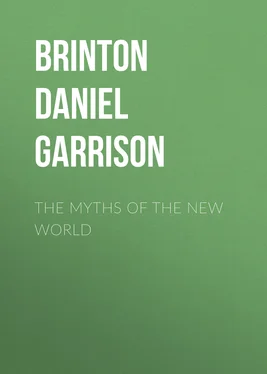Daniel Brinton - The Myths of the New World
Здесь есть возможность читать онлайн «Daniel Brinton - The Myths of the New World» — ознакомительный отрывок электронной книги совершенно бесплатно, а после прочтения отрывка купить полную версию. В некоторых случаях можно слушать аудио, скачать через торрент в формате fb2 и присутствует краткое содержание. Жанр: foreign_prose, История, Старинная литература, Мифы. Легенды. Эпос, foreign_edu, foreign_antique, на английском языке. Описание произведения, (предисловие) а так же отзывы посетителей доступны на портале библиотеки ЛибКат.
- Название:The Myths of the New World
- Автор:
- Жанр:
- Год:неизвестен
- ISBN:нет данных
- Рейтинг книги:5 / 5. Голосов: 1
-
Избранное:Добавить в избранное
- Отзывы:
-
Ваша оценка:
- 100
- 1
- 2
- 3
- 4
- 5
The Myths of the New World: краткое содержание, описание и аннотация
Предлагаем к чтению аннотацию, описание, краткое содержание или предисловие (зависит от того, что написал сам автор книги «The Myths of the New World»). Если вы не нашли необходимую информацию о книге — напишите в комментариях, мы постараемся отыскать её.
The Myths of the New World — читать онлайн ознакомительный отрывок
Ниже представлен текст книги, разбитый по страницам. Система сохранения места последней прочитанной страницы, позволяет с удобством читать онлайн бесплатно книгу «The Myths of the New World», без необходимости каждый раз заново искать на чём Вы остановились. Поставьте закладку, и сможете в любой момент перейти на страницу, на которой закончили чтение.
Интервал:
Закладка:
Thus it was among the Indians. Therefore a word is usually found in their languages analogous to none in any European tongue, a word comprehending all manifestations of the unseen world, yet conveying no sense of personal unity. It has been rendered spirit, demon, God, devil, mystery, magic, but commonly and rather absurdly by the English and French, “medicine.” In the Algonkin dialects this word is manito and oki , in Iroquois oki and otkon , the Dakota has wakan , the Aztec teotl , the Quichua huaca , and the Maya ku . They all express in its most general form the idea of the supernatural. And as in this word, supernatural, we see a transfer of a conception of place, and that it literally means that which is above the natural world, so in such as we can analyze of these vague and primitive terms the same trope appears discoverable. Wakan as an adverb means above , oki is but another orthography for oghee , and otkon seems allied to hetken , both of which have the same signification. 35 35 I offer these derivations with a certain degree of reserve, for such an extraordinary similarity in the sound of these words is discoverable in North and portions of South America, that one might almost be tempted to claim for them one original form. Thus in the Maya dialects it is ku , vocative â kue , in Natchez kue-ya , in the Uchee of West Florida kauhwu , in Otomi okha , in Mandan okee , Sioux ogha , waughon , wakan , in Quichua waka , huaca , in Iroquois quaker , oki , Algonkin oki , okee , Eskimo aghatt , which last has a singular likeness in sound to the German or Norse, O Gott , as some of the others have to the corresponding Finnish word ukko . Ku in the Carib tongue means house , especially a temple or house of the gods. The early Spanish explorers adopted the word with the orthography cue , and applied it to the sacred edifices of whatever nation they discovered. For instance, they speak of the great cemetery of Teotihuacan, near Tezcuco, as the Llano de los Cues .
The transfer is no mere figure of speech, but has its origin in the very texture of the human mind. The heavens, the upper regions, are in every religion the supposed abode of the divine. What is higher is always the stronger and the nobler; a superior is one who is better than we are, and therefore a chieftain in Algonkin is called oghee-ma , the higher one. There is, moreover, a naif and spontaneous instinct which leads man in his ecstasies of joy, and in his paroxysms of fear or pain, to lift his hands and eyes to the overhanging firmament. There the sun and bright stars sojourn, emblems of glory and stability. Its azure vault has a mysterious attraction which invites the eye to gaze longer and longer into its infinite depths. 36 36 “As the high heavens, the far-off mountains look to us blue, so a blue superficies seems to recede from us. As we would fain pursue an attractive object that flees from us, so we like to gaze at the blue, not that it urges itself upon us, but that it draws us after it.” Goethe, Farbenlehre , secs. 780, 781.
Its color brings thoughts of serenity, peace, sunshine, and warmth. Even the rudest hunting tribes felt these sentiments, and as a metaphor in their speeches, and as a paint expressive of friendly design, blue was in wide use among them. 37 37 Loskiel, Geschichte der Mission der Evang. Brueder , p. 63: Barby, 1789.
So it came to pass that the idea of God was linked to the heavens long ere man asked himself, are the heavens material and God spiritual, is He one, or is He many? Numerous languages bear trace of this. The Latin Deus, the Greek Zeus, the Sanscrit Dyaus, the Chinese Tien, all originally meant the sky above, and our own word heaven is often employed synonymously with God. There is at first no personification in these expressions. They embrace all unseen agencies, they are void of personality, and yet to the illogical primitive man there is nothing contradictory in making them the object of his prayers. The Mayas had legions of gods; “ ku ,” says their historian, 38 38 Cogolludo, Historia de Yucathan , lib. iv. cap. vii.
“does not signify any particular god; yet their prayers are sometimes addressed to kue ,” which is the same word in the vocative case.
As the Latins called their united divinities Superi , those above, so Captain John Smith found that the Powhatans of Virginia employed the word oki , above, in the same sense, and it even had passed into a definite personification among them in the shape of an “idol of wood evil-favoredly carved.” In purer dialects of the Algonkin it is always indefinite, as in the terms nipoon oki , spirit of summer, pipoon oki , spirit of winter. Perhaps the word was introduced into Iroquois by the Hurons, neighbors and associates of the Algonkins. The Hurons applied it to that demoniac power “who rules the seasons of the year, who holds the winds and the waves in leash, who can give fortune to their undertakings, and relieve all their wants.” 39 39 Rel. de la Nouv. France. An 1636, p. 107.
In another and far distant branch of the Iroquois, the Nottoways of southern Virginia, it reappears under, the curious form quaker , doubtless a corruption of the Powhatan qui-oki , lesser gods. 40 40 This word is found in Gallatin’s vocabularies ( Transactions of the Am. Antiq. Soc. , vol. ii.), and may have partially induced that distinguished ethnologist to ascribe, as he does in more than one place, whatever notions the eastern tribes had of a Supreme Being to the teachings of the Quakers.
The proper Iroquois name of him to whom they prayed was garonhia , which again turns out on examination to be their common word for sky , and again in all probability from the verbal root gar , to be above. 41 41 Bruyas, Radices Verborum Iroquæorum , p. 84. This work is in Shea’s Library of American Linguistics, and is a most valuable contribution to philology. The same etymology is given by Lafitau, Mœurs des Sauvages , etc., Germ. trans., p. 65.
In the legends of the Aztecs and Quiches such phrases as “Heart of the Sky,” “Lord of the Sky,” “Prince of the Azure Planisphere,” “He above all,” are of frequent occurrence, and by a still bolder metaphor, the Araucanians, according to Molina, entitled their greatest god “The Soul of the Sky.”
This last expression leads to another train of thought. As the philosopher, pondering on the workings of self-consciousness, recognizes that various pathways lead up to God, so the primitive man, in forming his language, sometimes trod one, sometimes another. Whatever else sceptics have questioned, no one has yet presumed to doubt that if a God and a soul exist at all, they are of like essence. This firm belief has left its impress on language in the names devised to express the supernal, the spiritual world. If we seek hints from languages more familiar to us than the tongues of the Indians, and take for example this word spiritual ; we find it is from the Latin spirare , to blow, to breathe. If in Latin again we look for the derivation of animus , the mind, anima , the soul, they point to the Greek anemos , wind, and aémi , to blow. In Greek the words for soul or spirit, psuche , pneuma , thumos , all are directly from verbal roots expressing the motion of the wind or the breath. The Hebrew word ruah is translated in the Old Testament sometimes by wind, sometimes by spirit, sometimes by breath. Etymologically, in fact, ghosts and gusts, breaths and breezes, the Great Spirit and the Great Wind, are one and the same. It is easy to guess the reason of this. The soul is the life, the life is the breath. Invisible, imponderable, quickening with vigorous motion, slackening in rest and sleep, passing quite away in death, it is the most obvious sign of life. All nations grasped the analogy and identified the one with the other. But the breath is nothing but wind. How easy, therefore, to look upon the wind that moves up and down and to and fro upon the earth, that carries the clouds, itself unseen, that calls forth the terrible tempests and the various seasons, as the breath, the spirit of God, as God himself? So in the Mosaic record of creation, it is said “a mighty wind” passed over the formless sea and brought forth the world, and when the Almighty gave to the clay a living soul, he is said to have breathed into it “the wind of lives.”
Читать дальшеИнтервал:
Закладка:
Похожие книги на «The Myths of the New World»
Представляем Вашему вниманию похожие книги на «The Myths of the New World» списком для выбора. Мы отобрали схожую по названию и смыслу литературу в надежде предоставить читателям больше вариантов отыскать новые, интересные, ещё непрочитанные произведения.
Обсуждение, отзывы о книге «The Myths of the New World» и просто собственные мнения читателей. Оставьте ваши комментарии, напишите, что Вы думаете о произведении, его смысле или главных героях. Укажите что конкретно понравилось, а что нет, и почему Вы так считаете.












